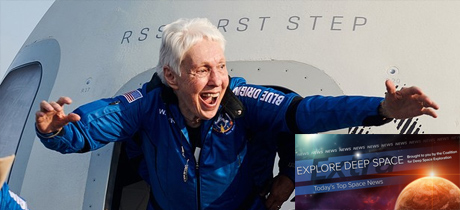In Today’s Deep Space Extra… The Nauka Multipurpose Laboratory Module set to launch to the International Space Station today. Lawmaker plans to introduce legislation that would establish excise taxes on commercial human space flights that aren’t focused on scientific research.
Human Space Exploration
Russia will launch a new science lab to the International Space Station Wednesday. Here’s how to watch.
Space.com (7/20): Russia has scheduled the launch of its Nauka Multipurpose Laboratory Module to the International Space Station (ISS) atop a Proton rocket from the Baikonur Cosmodrome in Kazakhstan for Wednesday morning. NASA will air and stream the launch of the major addition to the ISS’s Russian segment at 10:30 a.m. EDT, over NASA TV and www.nasa.gov/nasalive. Nauka’s transit to the ISS will take about eight days. The module will take the place of the ISS’s Pirs airlock and docking module, and Pirs will depart in the grasp of a Progress cargo capsule on Friday to burn up in the Earth’s atmosphere. Nauka includes the European Robotic Arm, which will join robotic arms previously provided by the Canadian and Japanese space agencies.
Dragon Endeavour performs port relocation to clear way for Starliner
Coalition Member in the News – Boeing
NASAspaceflight.com (7/21): The Crew Dragon capsule that was used to take NASA astronauts to the International Space Station (ISS) on the second operational flight under NASA’s commercial program was relocated today to make room for Boeing’s Starliner spacecraft, scheduled to launch to the ISS on its Orbital Flight Test-2 (OFT-2). The undocking began around 6:45 a.m. EDT and redocked at 7:35 a.m. EDT. Starliner is set to launch atop a United Launch Alliance (ULA) Atlas V rocket from Space Launch Complex-41 at Cape Canaveral Space Force Station on July 30.
Space Science
Amateur astronomer discovers a tiny moon around Jupiter
Space.com (7/20): Amateur astronomer Kai Ly is credited with discovering Jupiter’s 80th moon, a first for an amateur sky watcher. His find came from an online data set from 2003 that had been collected by researchers at the University of Hawai’i using the 3.6-meter Canada-France-Hawaii Telescope. The discovery was initially reported in the Sky and Telescope magazine.
Other News
Democrat proposes taxes on commercial space flights for nonscientific purposes
The Hill (7/20): U.S. Rep Earl Blumenauer, an Oregon Democrat and the senior member of U.S. House Ways and Means Committee, has proposed that an excise tax be levied on commercial human spaceflight not focused on scientific research. His announcement followed Tuesday’s launch of Blue Origin’s New Shepard to suborbital space with four passengers aboard, including Blue Origin founder Jeff Bezos. The lawmaker expressed concerns about environmental impacts of the launches and stated space participants should be taxed like those who travel on commercial airplanes.
Blue Origin launches first crewed flight with four crew, including founder Jeff Bezos and “Mercury 13” aviatrix Wally Funk
NASAspaceflight.com (7/20): Blue Origin’s New Shepard lofted four passengers to a suborbital altitude exceeding the von Karmen line, or an altitude of 62 miles, at 3 minutes and 45 seconds into its 10 ½-minute flight launched from Van Horn, Texas on Tuesday. Along with Blue Origin Founder Jeff Bezos and his brother Mark, Wally Funk, 82, emerged as the oldest human to reach space and Oliver Daemen, at 18, the youngest.
Blue Origin will launch 2 more passenger space flights this year after 1st astronaut launch success
Space.com (7/20): With New Shepard’s first suborbital launch with passengers behind it, Blue Origin now plans two more launches of the rocket this year. The next could come as soon as September.
Space executives: Regulations and incentives needed to curtail collisions and debris
Coalition Member in the News – Lockheed Martin
SpaceNews.com (7/20): Participants in an American Institute of Aeronautics and Astronautics (AIAA) virtual presentation on Tuesday warned that the safe deployments of government and commercial satellites will increase in difficulty without global rules focused on making space a sustainable environment. Participant Jennifer Warren, vice president of civil and regulatory affairs at Lockheed Martin, suggested that one stride forward could be to adopt the World Economic Forum’s Space Sustainability Rating (SSR), which would score manufacturers and operators based on different factors. Those include plans to de-orbit space systems upon completion of missions, reasoned selection of orbital altitude, transparency in detection and identification of spacecraft from the ground, collision-avoidance measures, restraint in the size and number of objects left in space from the launch vehicle, and data sharing.

